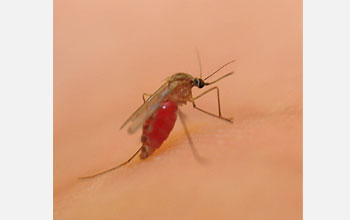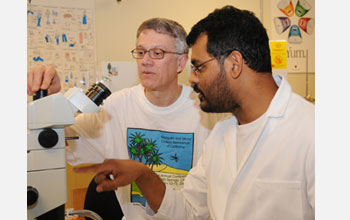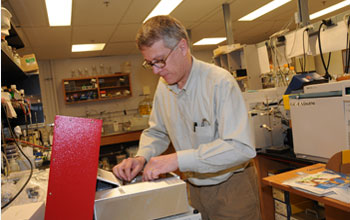
Aquí en al imagen apreciamos a un
MOSQUITO o
ZANCUDO , lleno de sangre después de haber succionado a un humano, y el contagio que viene como secuela, que puede ser el Paludismo o Dengue. Fuente : National Science Foundation.
PORQUÉ LE GUSTA LA SANGRE HUMANA AL MOSQUITO O ZANCUDO?
Las investigaciones realizadas por la National Science Foundation, hace un descubrimiento, para dar una explicación, porqué la sangre humana atrae al mosquito o zancudo:
El mosquito:
Culex quinquefasciatus mosquito es atraido por el olor de la sangre humana.
Cuando el tiempo fue propicio vino para el ecologista químico
Walter Leal para probar si la gente hace un olor natural que atrae mosquitos, Leal él mismo era el primero en ofrecerse.
" Medí mis propios niveles, " dijo Leal. " Pensé que yo daría buen ejemplo. Si usted lo hace primero, entonces no asustarán otros. "
De verdad, había poco, si alguno, la razón para ser asustada. Los científicos miraban sólo para la sustancia sí mismo, no tratando de averiguar si el compuesto atraería los insectos a una comida de sangre. Y los investigadores lo encontraron - no anal, una sustancia hecha por la gente y los pájaros que crean un olor poderoso cuyo hallazgo permite al que
Culex mosquitoes detectar un aroma irresistible.
Walter Leal sólo tuvo que enrollar su manga. Sus colegas pusieron un instrumento parecido a una jeringuilla al lado de su piel, y luego abrigado su brazo en la hoja de metal de aluminio para mantener el ambiente limitado. Después de una hora, la punta de la jeringuilla fue inyectada en una máquina especial para ver si la jeringuilla contuviera no anal y, si es así, cuánto su cuerpo había producido.
La abundancia, como ello resultó. " Está allí. Tengo mucho de ello, " dijo él. " Pienso que liberé 20 nanograms en una hora. Era alto. "
Aquellos resultados bien pueden explicar que le pasó hace dos años en México durante un escarabajo que caza el viaje de estudios cuando - a pesar de precauciones extensas - los mosquitos lo persiguieron con una venganza.
" Había tantos mosquitos, yo no podía creerlo, " recordó Walter Leal. " Rocié Deet por todas partes, incluyendo en mi pelo. La próxima mañana, comprendí que ellos habían examinado mis calcetines, y me habían mordido como el chiflado - y yo tenía sobre calcetines gruesos(espesos). Si usted olvida un punto particular, los mosquitos lo encontrarán - y entrarán. Ellos examinarán algo, aún vaqueros, mientras ellos saben que hay un vaso sanguíneo del otro lado. Ellos pueden sentir el calor. "
Sin embargo, mientras la mayoría de la gente evita insectos, sobre todo cortantes, Leal, un profesor de entomología en la Universidad de California (UC) en Davis, los busca con el entusiasmo.
" La diversidad y la fisiología de insectos son tan notables, " dijo él. " Un insecto es tan diferente del otro - esto es que los hace tan interesantes. "
En su investigación, Walter Leal es el mejor conocido para su trabajo sobre el sexo de insecto pheromones (mensajeros químicos) y la ecología química y la comunicación de insectos, todo con usos potenciales para el control de parásito. Él entendió(calculó) por qué los mosquitos son rechazados por Deet - ellos realmente odian su olor - y él ha identificado y ha sintetizado el complejo pheromones de tales insectos como escarabajos scarab, bichos verdaderos, longhorn escarabajos, polillas, orangeworm naval y aún cucarachas.
" Puedo trabajar con cualquier insecto, incluyendo la cucaracha, " dijo él. " Ellos no son tan agradables. Ellos comen casi todo, entonces es imposible hacerles un ambiente no accesible. Y es difícil de matarlos - ellos tienen sensores para el aire, tan cuando usted trata de golpearlos, ellos descubren el movimiento y se escapan(se marchan). He oído a la gente decir que ellos comen cucarachas, solamente(justo) mostrar que ellos no son tan malos. No soy uno de ellos. "
¿Su favorito personal? Scarab escarabajos. " Ellos son tan hermosos y elegantes, " dijo él. " Pero es muy difícil de trabajar con ellos aquí en California porque mucha de la especie es invasiva. Entonces no podemos tenerlos en California. "
Walter Leal creció en Recife, Brasil, donde su hermana y tres hermanos todavía viven. " Soy el único que se marchó, " dijo él. Él hizo su primer viaje a América en 1976 como un estudiante para ayudar a difundir actualidades sobre el equipo de fútbol brasileño durante la Copa Mundial Bicentenaria. " Todavía tengo aquel pasaporte, " dijo él.
Él se hizo interesado en publicaciones ambientales en el colegio, y recibió su licenciatura en la ingeniería de sustancia química de la Universidad Federal de Pernambuco en Recife. Él ganó sus dos grados avanzados de universidades en Japón, donde él pasó 16 años, la mayor parte de ellos trabajando para el gobierno japonés. Él ganó el grado de un maestro en la química agrícola de la Universidad Mie en Tsu-Mei, y un doctorado en la bioquímica aplicada de la Universidad Tsukuba en Tsukuba, cerca de Tokio. Él se movió a los Estados Unidos en 2000 cuando él se unió a la facultad UC Davis .
Recientemente, él fue seleccionado como un Senior de la Sociedad Entomológica de América, un honor prestigioso que reconoce hasta 10 miembros cada año para su investigación y enseñanza de contribuciones.
La esposa de Leal es una profesora de una escuela primaria, y la pareja tiene tres niños. Uno está en el colegio, otros dos son 12 y 9. Leal reclama para tener ningunas aficiones. " Trabajo tan con fuerza, no tengo ningún tiempo dejado abandonado, " dijo él. " En realidad, tengo aficiones, pero no tengo el tiempo para hacerlos. "
El ciclismo es uno de ellos, entonces él viaja diariamente al lugar de trabajo por la bicicleta casi cada día. Esto lo toma aproximadamente diez minutos. " Davis es una ciudad pequeña, amistosa de bici, con muchos cortes cortos, " dijo él.
Mucho le gustan bichos, Walter Leal dice que él no los prefiere para poblar. Al contrario, de hecho. " Me gusta la gente más, que es por qué trabajo con mosquitos - para proteger a la gente, " dijo él.
-- Marlene Cimons, National Science Foundation,
mcimons@nsf.govVersión de NATIONAL SCIENCE FOUNDATIONIn English:
Discovery
Why Human Blood Drives Mosquitoes Wild
 UC Davis chemical ecologist Walter Leal identifies the chemical source of an annoying attraction February 8, 2010 When the time came for chemical ecologist Walter Leal to test whether humans make a natural odor that attracts mosquitoes, Leal himself was the first to volunteer. "I measured my own levels," Leal said. "I thought I would set a good example. If you do it first, then others won't be scared." In truth, there was little, if any, reason to be frightened. The scientists were looking only for the substance itself, not trying to find out whether the compound would lure the insects to a blood meal. And the researchers found it--nonanal, a substance made by humans and birds that creates a powerful scent that Culex mosquitoes find irresistible. Leal only had to roll up his sleeve. His colleagues laid a syringe-like instrument next to his skin, and then wrapped his arm in aluminum foil to keep the environment confined. After an hour, the tip of the syringe was injected into a special machine to see if the syringe contained nonanal and, if so, how much his body had produced. Plenty, as it turned out. "It's there. I have lots of it," he said. "I think I released 20 nanograms in an hour. It was high." Those results may well explain what happened to him two years ago in Mexico during a beetle hunting field trip when--despite extensive precautions--mosquitoes went after him with a vengeance. "There were so many mosquitoes, I could not believe it," Leal recalled. "I sprayed Deet everywhere, including in my hair. The next morning, I realized they'd gone through my socks, and bitten me like crazy--and I had on thick socks. If you forget about one particular spot, the mosquitoes will find it--and go in. They'll go through anything, even jeans, as long as they know there is a blood vessel on the other side. They can sense the heat." Nevertheless, while most people avoid insects, especially biting ones, Leal, a professor of entomology at the University of California (UC) at Davis, searches for them with enthusiasm. "The diversity and physiology of insects is so remarkable," he said. "One insect is so different from another--that's what makes them so interesting." In his research, Leal is best known for his work on insect sex pheromones (chemical messengers) and the chemical ecology and communication of insects, all with potential applications for pest control. He figured out why mosquitoes are repelled by Deet--they really hate its smell--and he has identified and synthesized complex pheromones from such insects as scarab beetles, true bugs, longhorn beetles, moths, the naval orangeworm and even cockroaches. "I can work with any insects, including the cockroach," he said. "They are not so nice. They eat almost everything, so it is impossible to make an environment not accessible to them. And it's hard to kill them--they have sensors for air, so when you try to hit them, they detect the movement and get away. I have heard people say that they eat cockroaches, just to show they're not so bad. I'm not one of them." His personal favorite? Scarab beetles. "They are so beautiful and elegant," he said. "But it's very difficult to work with them here in California because many of the species are invasive. So we can't have them in California." Leal grew up in Recife, Brazil, where his sister and three brothers still live. "I am the only one who left," he said. He made his first trip to America in 1976 as a student to help broadcast news stories about the Brazilian soccer team during the Bicentennial World Cup. "I still have that passport," he said. He became interested in environmental issues in college, and received his bachelor's degree in chemical engineering from the Federal University of Pernambuco in Recife. He earned his two advanced degrees from universities in Japan, where he spent 16 years, most of them working for the Japanese government. He earned a master's degree in agricultural chemistry from Mie University in Tsu-Mei, and a doctorate in applied biochemistry from Tsukuba University in Tsukuba, near Tokyo. He moved to the United States in 2000 when he joined the UC Davis faculty. Recently, he was selected as a fellow of the Entomological Society of America, a prestigious honor that recognizes up to 10 members each year for their research and teaching contributions. Leal's wife is an elementary school teacher, and the couple has three children. One is in college, the other two are 12 and 9. Leal claims to have no hobbies. "I work so hard, I have no time left," he said. "Actually, I have hobbies, but don't have time to do them." Cycling is one of them, so he commutes by bicycle almost every day. It takes him about ten minutes. "Davis is a small, bike-friendly town, with lots of short cuts," he said. Much as he loves bugs, Leal says he doesn't prefer them to people. Quite the opposite, in fact. "I like people more, which is why I work with mosquitoes--to protect people," he said. -- Marlene Cimons, National Science Foundation, mcimons@nsf.gov This Behind the Scenes article was provided to LiveScience in partnership with the National Science Foundation. Investigators
Walter Leal
Related Institutions/Organizations
University of California - Davis
Locations
California
Related Awards
#0918177 Unveiling the Robustness of the Insect's Olfactory System
Total Grants
$496,127 Related Websites
LiveScience.com: Animals: Why Human Blood Drives Mosquitoes Wild: http://www.nsf.gov/cgi-bin/good-bye?http://www.livescience.com/animals/mosquitoes-human-blood-bts-100122.html
UC Davis Press Release: http://www.nsf.gov/cgi-bin/good-bye?http://entomology.ucdavis.edu/news/nonanalresearch.html
|  |  | 
Walter Leal, professor of entomology, and Zain Syed, postdoctoral researcher, work in Leal's lab.
Credit and Larger Version

Chemical ecologist Walter Leal at work in his laboratory.
Credit and Larger Version
|
|  |
 |  |  |  |
|
Discovery
Why Human Blood Drives Mosquitoes Wild
 Back to article Note about images  | The Culex quinquefasciatus mosquito is an insect that is attracted to the scent of human blood.
Credit: Kathy Keatley Garvey, UC Davis Department of Entomology |
Download the high-resolution JPG version of the image. (113 KB)
| Use your mouse to right-click (Mac users may need to Ctrl-click) the link above and choose the option that will save the file or target to your computer.
|
 | Walter Leal, professor of entomology, and Zain Syed, postdoctoral researcher, work in Leal's laboratory at the University of California, Davis.
Credit: Kathy Keatley Garvey, UC Davis Department of Entomology |
Download the high-resolution JPG version of the image. (4.8 MB)
| Use your mouse to right-click (Mac users may need to Ctrl-click) the link above and choose the option that will save the file or target to your computer.
|
 | Walter Leal, chemical ecologist and newly elected member of the Entomological Society of America, at work in his laboratory.
Credit: Kathy Keatley Garvey, UC Davis Department of Entomology |
Download the high-resolution JPG version of the image. (2.3 MB)
| Use your mouse to right-click (Mac users may need to Ctrl-click) the link above and choose the option that will save the file or target to your computer.
|
|  |  |
 |  |  |  |
|
Amigos, el científico
Walter Leal, investigador de
National Science Foundation, nos ha dado a conocer su afición por los insectos y ha hecho el descubrimiento , el porqué los zancudos o mosquitos acuden a succionar la sange del ser humano, porque nosotros mismos le damos el olor que le hace irresistible perseguirnos y tomar su cena con nuestra sangre. La reproducción en inglés que hemos realizado es fiel copia de la original del NSF. Y la traducción con todos sus errores es nuestro trabajo.
Guillermo Gonzalo Sánchez Achutegui
ayabaca@gmail.com
ayabaca@hotmail.com
ayabaca@yahoo.com
 Aquí en al imagen apreciamos a un MOSQUITO o ZANCUDO , lleno de sangre después de haber succionado a un humano, y el contagio que viene como secuela, que puede ser el Paludismo o Dengue. Fuente : National Science Foundation.
Aquí en al imagen apreciamos a un MOSQUITO o ZANCUDO , lleno de sangre después de haber succionado a un humano, y el contagio que viene como secuela, que puede ser el Paludismo o Dengue. Fuente : National Science Foundation.





No hay comentarios:
Publicar un comentario